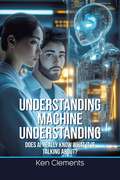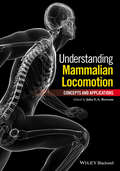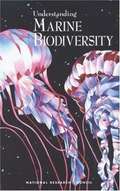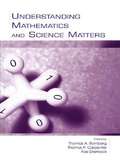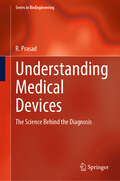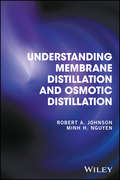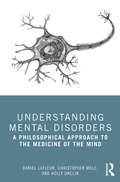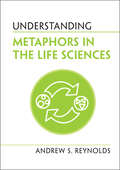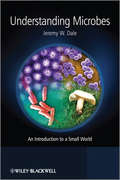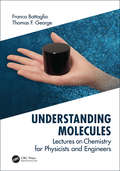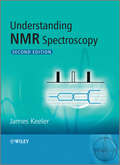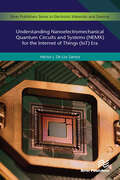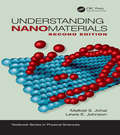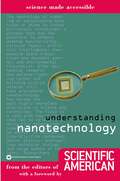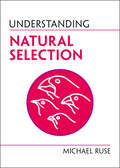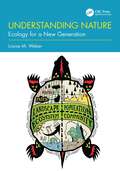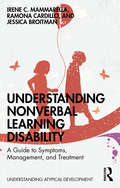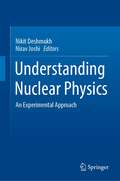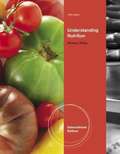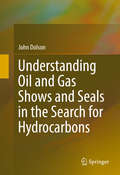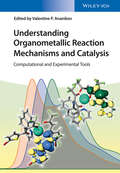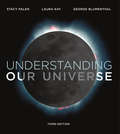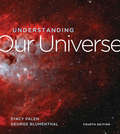- Table View
- List View
Understanding Machine Understanding: Does AI Really Know What It Is Talking About?
by Ken ClementsThis is a comprehensive and thought-provoking exploration of the nature of machine understanding, its evaluation, and its implications. The book proposes a new framework, the Multifaceted Understanding Test Tool (MUTT), for assessing machine understanding
Understanding Mammalian Locomotion
by John E. BertramUnderstanding Mammalian Locomotion will formally introduce the emerging perspective of collision dynamics in mammalian terrestrial locomotion and explain how it influences the interpretation of form and functional capabilities. The objective is to bring the reader interested in the function and mechanics of mammalian terrestrial locomotion to a sophisticated conceptual understanding of the relevant mechanics and the current debate ongoing in the field.
Understanding Marine Biodiversity: A Research Agenda for the Nation
by Committee on Biological Diversity in Marine SystemsThe diversity of marine life is being affected dramatically by fishery operations, chemical pollution and eutrophication, alteration of physical habitat, exotic species invasion, and effects of other human activities. Effective solutions will require an expanded understanding of the patterns and processes that control the diversity of life in the sea.Understanding Marine Biodiverity outlines the current state of our knowledge, and propose research agenda on marine biological diversity. This agenda represents a fundamental change in studying the ocean--emphasizing regional research across a range of space and time scales, enhancing the interface between taxonomy and ecology, and linking oceanographic and ecological approaches.Highlighted with examples and brief case studies, this volume illustrates the depth and breadth of undescribed marine biodiversity, explores critical environmental issues, advocates the use of regionally defined model systems, and identifies a series of key biodiversity research questions. The authors examine the utility of various research approaches--theory and modeling, retrospective analysis, integration of biotic and oceanographic surveys--and review recent advances in molecular genetics, instrumentation, and sampling techniques applicable to the research agenda. Throughout the book the critical role of taxonomy is emphasized.Informative to the scientist and accessible to the policymaker, Understanding Marine Biodiversity will be of specific interest to marine biologists, ecologists, oceanographers, and research administrators, and to government agencies responsible for utilizing, managing, and protecting the oceans.
Understanding Mathematics and Science Matters (Studies in Mathematical Thinking and Learning Series)
by Thomas A. Romberg, Thomas P. Carpenter and Fae DremockThe research reported in this book provides reliable evidence on and knowledge about mathematics and science instruction that emphasizes student understanding--instruction consistent with the needs of students who will be citizens in an increasingly demanding technological world.The National Center for Improving Student Learning in Mathematics and Science--established in 1996 as a research center and funded by the U.S. Department of Education--was instrumental in developing instructional practices supportive of high student achievement in and understanding of mathematics and science concepts. NCISLA researchers worked with teachers, students, and administrators to construct learning environments that exemplify current research and theory about effective learning of mathematics and science. The careful programs of research conducted examined how instructional content and design, assessment, professional development, and organizational support can be designed, implemented, and orchestrated to support the learning of all students. This book presents a summary of the concepts, findings, and conclusions of the Center's research from 1996-2001.In the Introduction, the chapters in Understanding Mathematics and Science Matters are situated in terms of the reform movement in school mathematics and school science. Three thematically structured sections focus on, respectively, research directed toward what is involved when students learn mathematics and science with understanding; research on the role of teachers and the problems they face when attempting to teach their students mathematics and science with understanding; and a collaboration among some of the contributors to this volume to gather information about classroom assessment practices and organizational support for reform.The goal of this book is to help educational practitioners, policymakers, and the general public to see the validity of the reform recommendations, understand the recommended guidelines, and to use these to transform teaching and learning of mathematics and science in U.S. classrooms.
Understanding Matter (Inspire Science, Grade 7 Integrated #Unit 1)
by Douglas Fisher Ralph M. Feather Jr. Alton L. BiggsNIMAC-sourced textbook
Understanding Medical Devices: The Science Behind the Diagnosis (Series in BioEngineering)
by R. PrasadThis book provides an accessible and comprehensive exploration of the principles and mechanisms behind widely used medical diagnostic tools. Written in clear, simple language, it offers a deep understanding of these instruments, their functionality, and the underlying science, making it ideal for a broad audience, including medical professionals, educators, and curious readers. The book begins with foundational concepts such as electromagnetic radiation, analog and digital signals, and binary systems, before diving into detailed discussions of key diagnostic tools like the stethoscope, thermometer, and pulse oximeter. Advanced imaging technologies such as X-rays, CT scans, MRI, and PET scans are thoroughly explained, along with non-invasive tools like ultrasound scanners and glucometers. Each chapter emphasizes the real-world applications and significance of these devices, with simple explanations supported by illustrative examples and figures. Designed for mixed readership, this book provides insights into the science behind diagnostic tools while also fostering a deeper appreciation for their practical impact on healthcare.
Understanding Membrane Distillation and Osmotic Distillation
by Robert A. Johnson Minh H. NguyenThis book addresses principles and practical applications of membrane distillation and osmotic distillation, separation technologies which are gaining increasing attention due to their advantages over conventional concentration processes.• Addresses membrane and osmotic distillation, two closely related and novel processes that offer several advantages over conventional concentration processes• Has a widespread impact and application of the technology in industries such as food, environment, and nuclear clean-up / containment• Covers theoretical aspects of both processes, the properties of hydrophobic membranes, process economics, integrated processes and future prospects.• Caters the presentation caters for the diversity of readership with respect to links with membrane technologies.
Understanding Mental Disorders: A Philosophical Approach to the Medicine of the Mind
by Daniel Lafleur Christopher Mole Holly OnclinUnderstanding Mental Disorders aims to help current and future psychiatrists, and those who work with them, to think critically about the ethical, conceptual, and methodological questions that are raised by the theory and practice of psychiatry. It considers questions that concern the mind’s relationship to the brain, the origins of our norms for thinking and behavior, and the place of psychiatry in medicine, and in society more generally. With a focus on the current debates around psychiatry’s diagnostic categories, the authors ask where these categories come from, if psychiatry should be looking to find new categories that are based more immediately on observations of the brain, and whether psychiatrists need to employ any diagnostic categories at all. The book is a unique guide for readers who want to think carefully about the mind, mental disorders, and the practice of psychiatric medicine.
Understanding Metaphors in the Life Sciences (Understanding Life)
by Andrew S. ReynoldsCovering a range of metaphors from a diverse field of sciences, from cell and molecular biology to evolution, ecology, and biomedicine, Understanding Metaphors in the Life Sciences explores the positive and negative implications of the widespread use of metaphors in the biological and life sciences. From genetic codes, programs, and blueprints, to cell factories, survival of the fittest, the tree of life, selfish genes, and ecological niches, to genome editing with CRISPR's molecular scissors, metaphors are ubiquitous and vital components of the modern life sciences. But how exactly do metaphors help scientists to understand the objects they study? How can they mislead both scientists and laypeople alike? And what should we all understand about the implications of science's reliance on metaphorical speech and thought for objective knowledge and adequate public policy informed by science? This book will literally help you to better understand the metaphorical dimensions of science.
Understanding Microbes
by Jeremy W. DaleWe can't see them, but microbes are the dominant form of life on Earth. They make up half of the world's biomass. They were here billions of years before we were, and they will be here after we are gone. Without their activity, life as we know it would be impossible. Even within our own bodies, there are ten times as many bacterial cells as human cells. Understanding Microbes provides a clear, accessible introduction to this world of microbes.As well as looking at a selection of infectious diseases, including how they are prevented and treated, the book explores the importance of microbes in the environment, in the production and preservation of food, and their applications in biotechnology.This lively and engaging book provides the basics of microbiology, in a contemporary context. It will be equally useful for students across the biological, environmental and health sciences, and for the curious reader wanting to learn more about this fascinating subject.A highly-readable, concise introduction to the basics of microbiology placed in the context of the very latest developments in molecular biology and their impact on the microbial world.Numerous real-world examples range from how cows digest grass to the role of microbes in cancer and the impact of climate changeWell-illustrated in full colour throughout.Written by an Author with a proven track record in teaching, writing and research.
Understanding Molecules: Lectures on Chemistry for Physicists and Engineers
by Thomas F. George Franco BattagliaChemistry is a subject that many students with differing goals have to tackle. This unique general chemistry textbook is tailored to more mathematically-oriented engineering or physics students. The authors emphasize the principles underlying chemistry rather than chemistry itself and the almost encyclopedic completeness appearing in a common textbook of general chemistry is sacrificed for an emphasis to these principles. Contained within 300 pages, it is suitable for a one-semester course for students who have a strong background in calculus. Over 200 problems with answers are provided so that the students can check their progress.
Understanding NMR Spectroscopy
by James KeelerThis text is aimed at people who have some familiarity with high-resolution NMR and who wish to deepen their understanding of how NMR experiments actually 'work'. This revised and updated edition takes the same approach as the highly-acclaimed first edition. The text concentrates on the description of commonly-used experiments and explains in detail the theory behind how such experiments work. The quantum mechanical tools needed to analyse pulse sequences are introduced set by step, but the approach is relatively informal with the emphasis on obtaining a good understanding of how the experiments actually work. The use of two-colour printing and a new larger format improves the readability of the text. In addition, a number of new topics have been introduced: How product operators can be extended to describe experiments in AX2 and AX3 spin systems, thus making it possible to discuss the important APT, INEPT and DEPT experiments often used in carbon-13 NMR. Spin system analysis i.e. how shifts and couplings can be extracted from strongly-coupled (second-order) spectra. How the presence of chemically equivalent spins leads to spectral features which are somewhat unusual and possibly misleading, even at high magnetic fields. A discussion of chemical exchange effects has been introduced in order to help with the explanation of transverse relaxation. The double-quantum spectroscopy of a three-spin system is now considered in more detail. Reviews of the First Edition "For anyone wishing to know what really goes on in their NMR experiments, I would highly recommend this book" - Chemistry World "...I warmly recommend for budding NMR spectroscopists, or others who wish to deepen their understanding of elementary NMR theory or theoretical tools" - Magnetic Resonance in Chemistry
Understanding Nanoelectromechanical Quantum Circuits and Systems (NEMX) for the Internet of Things (IoT) Era
by Héctor J. SantosThe operational theme permeating most definitions of the IoT concept, is the wireless communication of networked objects, in particular, smart sensing devices and machines, exchanging data a la Internet. In this book, a detailed look is taken at the fundamental principles of devices and techniques whose exploitation will facilitate the development of compact, power-efficient, autonomous, smart, networked sensing nodes underlying and encompassing the emerging IoT era.The book provides an understanding of nanoelectromechanical quantum circuits and systems (NEMX), as exemplified by firstly the uncovering of their origins, impetus and motivation, and secondly by developing an understanding of their device physics, including, the topics of actuation, mechanical vibration and sensing. Next the fundamentals of key devices, namely, MEMS/NEMS switches, varactors and resonators are covered, including a wide range of implementations. The book then looks at their energy supply via energy harvesting, as derived from wireless energy and mechanical vibrations. Finally, after an introduction to the fundamentals of IoT networks and nodes, the book concludes with an exploration of how the NEMX components are encroaching in a variety of emerging IoT applications.
Understanding Nanomaterials, Second Edition (Textbook Series in Physical Sciences)
by Malkiat S. Johal Lewis E. JohnsonPraise for the first edition"clear and informative” ?Chemistry World The authors provide the perfect training tool for the workforce in nanotech development by presenting the fundamental principles that govern the fabrication, characterization, and application of nanomaterials. This edition represents a complete overhaul, giving a much more complete, self-contained introduction. As before, the text avoids excessive mathematical detail and is written in an easy to follow, appealing style suitable for anyone, regardless of background in physics, chemistry, engineering, or biology. The organization has been revised to include fundamental physical chemistry and physics pertaining to relevant electrical, mechanical, and optical material properties. Incorporates new and expanded content on hard materials, semiconductors for nanoelectronics, and nonlinear optical materials. Adds many more worked examples and end-of-chapter problems. Provides more complete coverage of fundamentals including relevant aspects of thermodynamics, kinetics, quantum mechanics, and solid-state physics, and also significantly expands treatment of solid-phase systems. Malkiat S. Johal is a professor of physical chemistry at Pomona College, and earned his doctorate in physical chemistry at the University of Cambridge, UK. Lewis E. Johnson is a research scientist at the University of Washington, where he also earned his doctorate in chemistry and nanotechnology.
Understanding Nanotechnology
by The Editors of Scientific AmericanTaken from the Greek, nano means 'one billionth part of' a whole; or very, very small. Nanotechnology is the next step after miniaturization. This book explores the cutting edge of a new technology that will find usage in almost every single aspect of modern society.
Understanding Natural Selection (Understanding Life)
by Michael RuseNatural selection, as introduced by Charles Darwin in the Origin of Species (1859), has always been a topic of great conceptual and empirical interest. This book puts Darwin's theory of evolution in historical context showing that, in important respects, his central mechanism of natural selection gives the clue to understanding the nature of organisms. Natural selection has important implications, not just for the understanding of life's history – single-celled organism to man – but also for our understanding of contemporary social norms, as well as the nature of religious belief. The book is written in clear, non-technical language, appealing not just to philosophers, historians, and biologists, but also to general readers who find thinking about important issues both challenging and exciting.
Understanding Nature: Ecology for a New Generation
by Louise M. WeberUnderstanding Nature is a new kind of ecology textbook: a straightforward resource that teaches natural history and ecological content, and a way to instruct students that will nurture both Earth and self. While meeting the textbook guidelines set forth by the Ecological Society of America, Understanding Nature has a unique ecotherapy theme, using a historical framework to teach ecological theory to undergraduates. This textbook presents all the core information without being unnecessarily wordy or lengthy, using simple, relatable language and discussing ecology in ways that any student can apply in real life. Uniquely, it is also a manual on how to improve one’s relationship with the Earth. This is accomplished through coverage of natural history, ecology, and applications, together with suggested field activities that start each chapter and thinking questions that end each chapter. The book includes traditional ecological knowledge as well as the history of scientific ecological knowledge. Understanding Nature teaches theory and applications that will heal the Earth. It also teaches long-term sustainability practices for one’s psyche. Professor Louise Weber is both an ecologist and a certified ecopsychologist, challenging ecology instructors to rethink what and how they teach about nature. Her book bridges the gap between students taking ecology to become ecologists and those taking ecology as a requirement, who will use the knowledge to become informed citizens.
Understanding Nonverbal Learning Disability: A Guide to Symptoms, Management and Treatment (Understanding Atypical Development)
by Jessica Broitman Irene C. Mammarella Ramona CardilloThis essential book offers an accessible, evidence-based guide to Nonverbal Learning Disability (NVLD) informed by the most current research, and clinical and educational practice. It provides a thorough explanation of the science behind the condition, alongside ideas, support, and practical tips for managing the everyday challenges of the disorder at school and in family life. Mammarella, Cardillo, and Broitman describe the main characteristics of the condition from both theoretical and practical points of view, as well as examining the similarities and differences between NVLD and other neurodevelopmental disorders. They explore the cognitive and academic weaknesses and strengths of children with NVLD, and the emotional and social difficulties they may experience. The book also provides a systematic review of scientific studies in this field whilst focusing on issues of diagnostic criteria, as well as assessment and intervention strategies. Practical examples are given for teachers and parents to help support children with NVLD in improving their visuospatial and motor skills, as well as peer-social relations, and in promoting the child’s individual abilities. Understanding Nonverbal Learning Disability is essential reading for parents and practitioners in clinical and educational psychology, and health and social care, and students in these fields.
Understanding Nuclear Physics: An Experimental Approach
by Nirav Joshi Nikit DeshmukhThis book provides a unique approach to understand the Nuclear Physics, especially from the experimental end. The highlight of this book is that special care has been taken to provide more experimental information, considering real experimental data which has been published in several journals. Special experimental focus is given to methodologies involving: offline gamma counting and online particle detection. The book provides information about recent developments in accelerators, overview of the detectors and concise information of associated electronics, data acquisition systems and computers for data analysis.
Understanding Nutrition
by Ellie Whitney Sharon Rady RolfesThe updated 16th Edition of Whitney/Rolfe's bestselling UNDERSTANDING NUTRITION presents the core information of an introductory nutrition course for majors, with active learning that prepares students for their future careers. An overarching goal of the text is to help readers learn to distinguish valid nutrition information from misinformation. In addition to providing accurate information, the text encourages readers to understand the connections between concepts, evaluate the pros and cons of an argument, detect inconsistencies and errors, solve problems, and identify the relevance of information.
Understanding Nutrition (Thirteenth Edition)
by Eleanor Noss Whitney Sharon Rady RolfesThis best-selling introductory nutrition text is praised for its approachable narrative, engaging presentation, and careful explanations. The new Thirteenth Edition of Whitney and Rolfes' UNDERSTANDING NUTRITION takes the study of nutrition to a new level with an integrated pedagogy and an emphasis on active learning, assignable content, and integrated resources. From its beautiful and carefully developed art program to its strong science base, contemporary coverage, and market-leading supplements, the Thirteenth Edition of UNDERSTANDING NUTRITION connects with its readers and continues to set the standard for texts in this market. This text includes 20 chapters beginning with core nutrition topics, such as diet planning, macronutrients, vitamins and minerals, and following with chapters on diet and health, fitness, life span nutrition, food safety, and world hunger. UNDERSTANDING NUTRITION connects with students--engaging them as it teaches the basic concepts and applications of nutrition.
Understanding Oil and Gas Shows and Seals in the Search for Hydrocarbons
by John DolsonThe book covers in detail the ways to understand how to use oil and gas show information to find hydrocarbons. It covers the basics of exploration methodologies, drilling and mud systems, cuttings and mud gas show evaluation, fundamental log analysis and pitfalls to log-calculated water saturations. A complete overview of the use of pressures to understand traps and migration, hydrodynamics, and seal and reservoir quantification using capillary pressure to underpin important fundamental concepts every petroleum geologist must know. Techniques for quickly generating pseudo-capillary pressure curves from simple porosity/permeability data, with examples of how to build the spreadsheets in Excel, provide quick and simple ways to determine where a test or sample may be in a trap based on its water saturation and rock properties. In addition, a complete treatment of fluid inclusion analysis and fluid inclusion stratigraphy to map migration pathways and recognize by-passed or near miss pay zones is covered and illustrated with numerous examples. Lastly, petroleum systems modeling and fundamental source rock geochemistry is discussed at depth, particularly in the context of unconventional source rock evaluation and screening tools for entering new plays. The promise, perils, and pitfalls of understanding and modeling migration in 3 dimensional space with modern software is examined with an eye toward how to visualize hydrocarbon shows as a means of validating or rejecting the model results. Perhaps more importantly, the book is heavily illustrated with numerous examples and case histories from the author's 37 years of exploration experience. The topics covered in this book will give any young geoscientist a quick start on a successful career and serve as a refresher for the more experienced explorers.
Understanding Organometallic Reaction Mechanisms and Catalysis
by Valentin P. AnanikovThis handbook and ready reference highlights the latest insights and developments in the studies of important organometallic, homogeneous, and heterogeneous reaction mechanisms. It adopts a unique approach, exemplifying how to use experiments, spectroscopic investigations, and computational methods to reveal reaction pathways and molecular structures of catalysts, rather than concentrating solely on one discipline. The result is a deeper understanding of the underlying reaction mechanisms and correlation between molecular structure and reactivity. The contributions represent a wealth of first-hand information from renowned experts working in all major disciplines, covering such topics as activation of small molecules, palladium catalysis, cross-coupling reactions, and nanoparticle synthesis. With the knowledge gained, the reader will be able to improve existing reaction protocols and rationally design more efficient catalysts or selective reactions.An indispensable source of information for synthetic, analytical, and theoretical chemists in academia and industry alike.
Understanding Our Universe
by Laura Kay Stacy Palen George BlumenthalResearch shows that active learning supports deeper, long-term understanding. The Third Edition text and media package gives students more opportunities to interact with astronomy--both in real life and online. The new edition provides all the resources you need to make it easy to incorporate active learning into the classroom.
Understanding Our Universe (Fourth Edition)
by Stacy Palen George BlumenthalThe most innovative resources for the most important course Stacy Palen knows that introductory astronomy may be the only science course some students take in their college careers, so it’s their best chance to develop scientific literacy. Education research shows that the best way to attain scientific literacy is through active learning. Understanding Our Universe, Fourth Edition makes it easier for instructors to help students understand the concepts and learn to value science by providing activities that can be used before, during, and after class. By expanding her pedagogy to include What If scenarios and What an Astronomer Sees figure captions, Stacy helps students build scientific literacy and to think critically about science in the media. This purchase offers access to the digital ebook only.
